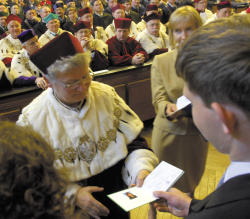Questions and Answers
 Q: What do I need to enroll?
Q: What do I need to enroll?
A: To qualify all international applicants must first meet the minimum requirements for entry into higher education in their own country, have a matriculation certificate or equivalent document; command of English (at least on an intermediate level) is also required.
Some departments of the arts, physical education, departments preparing students for the teaching profession, and the like, organize additional aptitude tests.
All graduating from Polish institutions of higher education receive a Diploma Supplement. The Supplement is available free of charge and is issued in Polish, and on request in other languages (English, German, French, Spanish or Russian). Since Poland ratified the Lisbon Convention on Recognition of Degrees in 2004 recognition of Polish diplomas has become easier inter-nationally. For information on diploma recognition please visit www.buwiwm.edu.pl.
Q: When academic year starts and ends?
A: In most cases the academic year at Polish universities consists of 2 semesters of 15 weeks duration each.
Fall semester starts in the beginning of October and lasts till mid-February, with two-week break for Christmas holidays and with a one-week vacation period in February. Spring semester starts in mid February and lasts till the end of June, with one-week break for Easter holidays. Summer vacation lasts from the beginning of July to the end of September.
Q: Studying in Poland: How much does it cost?
A: In Poland full-time education at state institutions of higher education is free for Polish citiziens. It is also free for foreigners who commence studies in at state HEIs on terms applicable to Polish citizens. All other foreigners are required to pay tuition fees of no less than a PLN equivalent of:
Fall semester starts in the beginning of October and lasts till mid-February, with two-week break for Christmas holidays and with a one-week vacation period in February. Spring semester starts in mid February and lasts till the end of June, with one-week break for Easter holidays. Summer vacation lasts from the beginning of July to the end of September.
Q: Studying in Poland: How much does it cost?
A: In Poland full-time education at state institutions of higher education is free for Polish citiziens. It is also free for foreigners who commence studies in at state HEIs on terms applicable to Polish citizens. All other foreigners are required to pay tuition fees of no less than a PLN equivalent of:
- EUR 2000 per year for professional higher study, master's and postgraduate master's courses;
- EUR 3000 per year for doctoral, postgraduate and specialist courses and scientific, artistic, specialist and habilitation internships;
- EUR 3000 per year for vocational courses and apprenticeships;
- EUR 2000 per year for a language course, including a course preparing for study in Polish.
In justified cases the Rector of the HEI may, at the student's request, reduce the tuition fee or waive it altogether.
Q: Do I need to speak fluent Polish?
A: You do not need to because universities offer a large variety of study programmes in English. Nevertheless, you may learn Polish either for private everyday use for the time you stay in Poland, or for joining a university course in Polish. Courses of Polish language and culture or survival Polish with orientation programmes are organized by most universities hosting foreign students. This type of course can last for a few weeks just before the academic year or can run throughout the whole semester.
In case you choose Polish as the language of your studies, however, you will be required to prove your proficiency in Polish before you start your studies. Foreign students wishing to pursue studies in Polish are required to have a command of Polish, allowing them to understand lectures and other forms of tuition at universities see www.polonicum.uw.edu.pl.
Information on Polish language certificates is provided by the State Commission for Certification of Command of Polish as a Foreign Language (www.buwiwm.edu.pl).
Q: Are the study programmes accredited?
A: The State Accreditation Committee (www.pka.edu.pl), which has been operating
in Poland since January 2002, monitors and controls educational standards at state (public) and non-state (private) Polish institutions of higher education, and serves to improve and guarantee quality standards as well. 81% of the Polish state institutions of higher education have received outstanding and good ratings. The State Accreditation Committee has developed close co-operation with accreditation committees from other countries. The Polish quality assurance system complies with the ENQA Standards and Guidelines. There is also a voluntary accreditation system supervised by the academic community; accreditation procedures are carried out by commissions appointed by rectors of the different types of institutions of higher education. The voluntary accreditation system is considered the hallmark of high quality in teaching.
 Q: Do I need a visa? If so, how do I apply for one?
Q: Do I need a visa? If so, how do I apply for one?
A: EU/EEA students do not need any Polish visa, however upon arrival to Poland they should apply for a temporary residence permit if they stay in the country longer then 90 days. Non EU/EEA students need to arrive in Poland with a student's visa obtained at a Polish Embassy or Consulate in their country of residence. It is important to remember that visas are granted for a maximum of three months. In order to extend the stay in Poland, it is necessary to apply for a residence permit for specified period of time in Voivodeship office 45 days before visa expirattion date. For further assistance students are strongly urged to contact the International Relations Office of their university. More practical information about: coming to Poland, legalizing your stay, medical care and insurance, driving licence, addresses of diplomatic missions of in Poland is available at www.msz.gov.pl (Polish Ministry of Foreign Affairs).
Q: Is health insurance required?
A: Medical care in Poland is not free of charge. Health insurance is mandatory for all students for the entire duration of their stay in Poland. The students from non-EU/EEA countries are recommended to buy medical insurance in their home country or immediately after their arrival in Poland. Otherwise students are required to pay for any health service they get. Foreign students are also advised to purchase third party liability insurance and accident insurance.
EU citizens staying in Poland are legible for free health service, providing they present their European Health Insurance Card (EHIC).
EU citizens not having insurance in their country of residence and non-EU citizens may sign insurance agreement with the Polish Health National Fund (NFZ - Narodowy Fundusz Zdrowia) and purchase insurance for the monthly fee of 40 PLN.
Under bilateral agreements the citizens of the U.K., Sweden and Slovakia are entitled to free medical care. Under an agreement with the Czech Republic Czech students are entitled to necessary medical care in cases of sudden illness or accident. More information can be found on The National Health Fund website: www.nfz.gov.pl.
Q: Can I apply for scholarship?
A: All international students may apply for scholarships within bilateral agreements on direct cooperation offered through Bureau for Academic Recognition and International Exchange (www.buwiwm.edu.pl) to one of the following countries: Albania, Algeria, Angola, Argentina, Australia, Austria, Azerbaijan, Belgium, Belarus, Brazil, Bulgaria, Canada, Chile, China, Columbia, Croatia, Cuba, Cyprus, Czech Republic, Denmark, Egypt, Ecuador, Estonia, Finland, France, Greece, Georgia, Germany, Hungary, Iceland, Iran, Ireland, Israel, Italy, Japan, Jordan, Kazakhstan, Kyrgyzstan, Korea, Latvia, Lichtenstein, Lithuania, Luxembourg, Macedonia, Malta, Mexico, Moldova, Mongolia, Montenegro, the Netherlands, New Zealand, Norway, Peru, Portugal, Romania, Russia, Serbia, Slovakia, Slovenia, Spain, Syria, Switzerland, Sweden, Tajikistan, Taiwan, Tunisia, Turkey, the Ukraine, USA, Uzbekistan, the United Kingdom, Venezuela, Vietnam.
Scholarships for students from European Union are offered within the framework of the Socrates/Erasmus program (www.socrates.org.pl). In addition university scholarships are available for academic excellence.
 Q: How do I find accommodation?
Q: How do I find accommodation?
A: Most Polish universities provide accommodation for international students at their own dormitories, but the number of rooms is limited. The host university should help students in finding appropriate accommodation.
There is a possibility of renting a room or a flat in various parts of the city with other students. The prices differ depending on the standard, location and distance from the university. Accommodation in student dormitories costs about 400 PLN per month, shared flat from 1000 PLN to 1600 PLN per month.
Q: How much money do I need for living in Poland?
A: Depending on your personal situation, lifestyle and habits you may have different needs. In practice, you will need at least 1100-1300 PLN per month in order to cover the cost of decent accommodation, pay for the local transport, and even go out occasionally. This amount should cover the costs of rent, food, clothing, personal hygiene, local transport, study materials, telephone and other expenses - not the tuition fee however. Here is an approximate calculation of your monthly expenses: accommodation 400-600 PLN; food about 500 PLN; books and entertainment about 150-200 PLN; local transport about 65 PLN.
A: You do not need to because universities offer a large variety of study programmes in English. Nevertheless, you may learn Polish either for private everyday use for the time you stay in Poland, or for joining a university course in Polish. Courses of Polish language and culture or survival Polish with orientation programmes are organized by most universities hosting foreign students. This type of course can last for a few weeks just before the academic year or can run throughout the whole semester.
In case you choose Polish as the language of your studies, however, you will be required to prove your proficiency in Polish before you start your studies. Foreign students wishing to pursue studies in Polish are required to have a command of Polish, allowing them to understand lectures and other forms of tuition at universities see www.polonicum.uw.edu.pl.
Information on Polish language certificates is provided by the State Commission for Certification of Command of Polish as a Foreign Language (www.buwiwm.edu.pl).
Q: Are the study programmes accredited?
A: The State Accreditation Committee (www.pka.edu.pl), which has been operating
in Poland since January 2002, monitors and controls educational standards at state (public) and non-state (private) Polish institutions of higher education, and serves to improve and guarantee quality standards as well. 81% of the Polish state institutions of higher education have received outstanding and good ratings. The State Accreditation Committee has developed close co-operation with accreditation committees from other countries. The Polish quality assurance system complies with the ENQA Standards and Guidelines. There is also a voluntary accreditation system supervised by the academic community; accreditation procedures are carried out by commissions appointed by rectors of the different types of institutions of higher education. The voluntary accreditation system is considered the hallmark of high quality in teaching.
 Q: Do I need a visa? If so, how do I apply for one?
Q: Do I need a visa? If so, how do I apply for one?A: EU/EEA students do not need any Polish visa, however upon arrival to Poland they should apply for a temporary residence permit if they stay in the country longer then 90 days. Non EU/EEA students need to arrive in Poland with a student's visa obtained at a Polish Embassy or Consulate in their country of residence. It is important to remember that visas are granted for a maximum of three months. In order to extend the stay in Poland, it is necessary to apply for a residence permit for specified period of time in Voivodeship office 45 days before visa expirattion date. For further assistance students are strongly urged to contact the International Relations Office of their university. More practical information about: coming to Poland, legalizing your stay, medical care and insurance, driving licence, addresses of diplomatic missions of in Poland is available at www.msz.gov.pl (Polish Ministry of Foreign Affairs).
Q: Is health insurance required?
A: Medical care in Poland is not free of charge. Health insurance is mandatory for all students for the entire duration of their stay in Poland. The students from non-EU/EEA countries are recommended to buy medical insurance in their home country or immediately after their arrival in Poland. Otherwise students are required to pay for any health service they get. Foreign students are also advised to purchase third party liability insurance and accident insurance.
EU citizens staying in Poland are legible for free health service, providing they present their European Health Insurance Card (EHIC).
EU citizens not having insurance in their country of residence and non-EU citizens may sign insurance agreement with the Polish Health National Fund (NFZ - Narodowy Fundusz Zdrowia) and purchase insurance for the monthly fee of 40 PLN.
Under bilateral agreements the citizens of the U.K., Sweden and Slovakia are entitled to free medical care. Under an agreement with the Czech Republic Czech students are entitled to necessary medical care in cases of sudden illness or accident. More information can be found on The National Health Fund website: www.nfz.gov.pl.
Q: Can I apply for scholarship?
A: All international students may apply for scholarships within bilateral agreements on direct cooperation offered through Bureau for Academic Recognition and International Exchange (www.buwiwm.edu.pl) to one of the following countries: Albania, Algeria, Angola, Argentina, Australia, Austria, Azerbaijan, Belgium, Belarus, Brazil, Bulgaria, Canada, Chile, China, Columbia, Croatia, Cuba, Cyprus, Czech Republic, Denmark, Egypt, Ecuador, Estonia, Finland, France, Greece, Georgia, Germany, Hungary, Iceland, Iran, Ireland, Israel, Italy, Japan, Jordan, Kazakhstan, Kyrgyzstan, Korea, Latvia, Lichtenstein, Lithuania, Luxembourg, Macedonia, Malta, Mexico, Moldova, Mongolia, Montenegro, the Netherlands, New Zealand, Norway, Peru, Portugal, Romania, Russia, Serbia, Slovakia, Slovenia, Spain, Syria, Switzerland, Sweden, Tajikistan, Taiwan, Tunisia, Turkey, the Ukraine, USA, Uzbekistan, the United Kingdom, Venezuela, Vietnam.
Scholarships for students from European Union are offered within the framework of the Socrates/Erasmus program (www.socrates.org.pl). In addition university scholarships are available for academic excellence.
 Q: How do I find accommodation?
Q: How do I find accommodation?A: Most Polish universities provide accommodation for international students at their own dormitories, but the number of rooms is limited. The host university should help students in finding appropriate accommodation.
There is a possibility of renting a room or a flat in various parts of the city with other students. The prices differ depending on the standard, location and distance from the university. Accommodation in student dormitories costs about 400 PLN per month, shared flat from 1000 PLN to 1600 PLN per month.
Q: How much money do I need for living in Poland?
A: Depending on your personal situation, lifestyle and habits you may have different needs. In practice, you will need at least 1100-1300 PLN per month in order to cover the cost of decent accommodation, pay for the local transport, and even go out occasionally. This amount should cover the costs of rent, food, clothing, personal hygiene, local transport, study materials, telephone and other expenses - not the tuition fee however. Here is an approximate calculation of your monthly expenses: accommodation 400-600 PLN; food about 500 PLN; books and entertainment about 150-200 PLN; local transport about 65 PLN.
Below you will find a list of sample prices of goods and services available in Poland:
- month's rent for a single room: 400-600 PLN
- meal (lunch) in the university canteen: 5-10 PLN
- meal in the city centre (grill bar, small restaurant): 10-30 PLN
- coffee in the city centre: 4-10 PLN
- beer (0,5 litre in a pub): 7-10 PLN
- theatre/cinema ticket: 15-30 PLN
- haircut: 30-100 PLN
- bread: 1,5-2 PLN
- butter: 4 PLN
- water (5 litres) 3,50 PLN
- milk (1 litre) 2-2,5 PLN
- orange juice (1 litre) 2-5 PLN
- apples (1 kilo) 1,5-4 PLN
- oranges (1 kilo) 3,5-5 PLN
- cheese (1 kilo): 10-30 PLN
- ham (1 kilo): 15-30 PLN
- chocolate (1 bar): 2-4 PLN
- rice (1 kilo): 2-3 PLN
- meat (1 kilo): 14-30 PLN
- fish (1 kilo): 13-30 PLN
- chicken (1 grilled): 10-15 PLN
The official Polish currency is zloty (PLN).
- 1 EUR = 3,65 PLN l 1 USD = 2,45 PLN
- 1 CHF = 2,20 PLN l 1 GBP = 4,90 PLN
0 comments:
Post a Comment